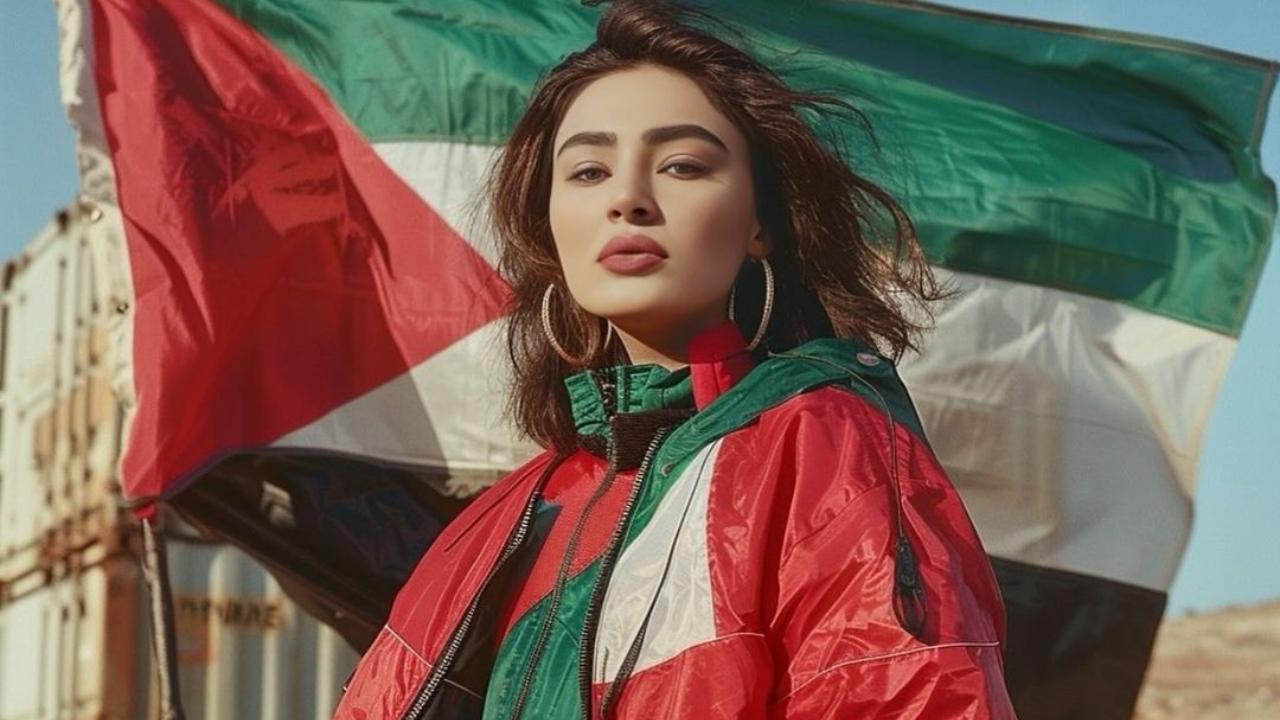
In a vehement online outburst, Pakistani actress Saheefa Jabbar Khattak has criticized Bollywood for its silence over Israel’s recent airstrike in Gaza, which led to the tragic deaths of 45 Palestinians. Saheefa expressed her frustration on social media, imploring people to stop idolizing and celebrating Bollywood stars who have remained silent on the issue, while highlighting the need for the Pakistani entertainment industry to focus on self-improvement.
Saheefa’s public tirade began with a post on Instagram where she expressed her disappointment and anger towards Bollywood celebrities. “While in the West everyone is blocking Hollywood celebrities and influencers, what are we doing about Bollywood?” Saheefa questioned. She added, “Our neighboring country, where we are eager to work, and where we speak so highly of them in our interviews, NONE of them have spoken against the ongoing genocide. Please stop wishing them birthdays and hyping them up.”
The actress elaborated on her statement, pointing out that Bollywood’s silence feels even more glaring, given the existing ban on Pakistani artists in India. “Their government has banned us from working ‘for them.’ Waisay bhee in the past we were rarely offered decent roles, and now, during this genocide, the whole of India is silent. It’s time that we focus on our craft, make better films and dramas, and stop seeking validation from them or anyone.”
The conflict in Gaza drew widespread international condemnation, especially following the airstrike on the southern Gaza city of Rafah. Local health officials reported that at least 45 Palestinians, including displaced individuals residing in makeshift tents, perished in the attack. The devastating event provoked emotional reactions worldwide and put a spotlight on the humanitarian crisis in Gaza.
Numerous prominent Indian celebrities, including Priyanka Chopra Jonas, Alia Bhatt, and Kareena Kapoor Khan, did extend their support for Palestine following the incident. Alia Bhatt shared a poignant Instagram story with an image captioned, “All children deserve love. All children deserve safety. All children deserve peace. All children deserve life.
. And all mothers deserve to be able to give their children those things.” Bhatt signed off her post with the hashtag “#AllEyesOnRafah.”
Similarly, Kareena Kapoor Khan, who was recently appointed the national ambassador for UNICEF India, shared another heartfelt message via a UNICEF post. “Images of burned children and families emerging from bombed tents in Rafah shocks us all. The reported killing of children sheltering in makeshift tents is unconscionable. For over seven months, we’ve witnessed this tragedy unfold, resulting in thousands of children killed or injured,” her post read. Kapoor’s post also called for an “immediate ceasefire” and the “unconditional release of all hostages,” as well as an end to the “senseless killing of children.”
Actress Richa Chadha also voiced her dissent by sharing a reel from a news outlet accusing Israel of “settler colonial genocide.” The video stated, “Anyone still supporting Israel is guilty of murdering literal babies.” In addition, stars like Priyanka Chopra Jonas, Sonam Kapoor, Samantha Ruth Prabhu, Konkona Sen Sharma, Atlee, Vir Das, Dia Mirza, Triptii Dimri, Shilpa Rao, Bhumi Pednekar, and Rakul Preet Singh participated in a viral Instagram trend by posting a picture captioned “All Eyes On Rafah.”
Despite these shows of solidarity, Saheefa’s critique seems particularly directed at those Bollywood figures who have remained conspicuously silent. This sentiment reflects a broader frustration with the perceived inaction or neutrality in the face of significant humanitarian crises.
The airstrike in Rafah further intensified discourse on international platforms, even drawing pointed criticism from some of Israel’s staunchest allies. Israeli Prime Minister Benjamin Netanyahu described the attack as a “tragic mishap,” a statement that did little to assuage growing international outrage.
In the realm of entertainment and celebrity influence, such global incidents often lead to calls for public figures to leverage their platforms more responsibly. Saheefa Jabbar Khattak’s passionate plea underscores the influential role of media and entertainment industries in shaping public discourse and response to crises.
In conclusion, while several Bollywood celebrities have expressed solidarity with Palestine, Saheefa Jabbar Khattak’s fierce criticism brings to the forefront the expectation for continual advocacy from their influential platforms. She emphasizes the need for the Pakistani entertainment community to focus on their own growth and not depend on external validation, thus calling for a poignant period of self-reflection and national prioritization.












